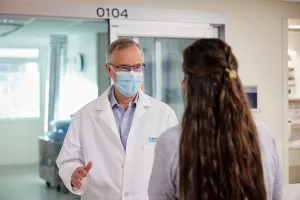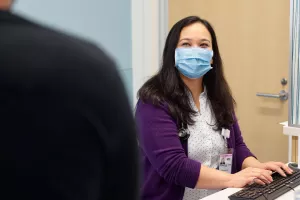Lung cancer is a type of cancer where abnormal cells in the lungs grow out of control. These cells form a tumor that can spread to other parts of the body.
Lung cancer is the 2nd most common cancer in the U.S.
There are about 220,500 new cases of lung cancer every year. The most common cause of lung cancer is tobacco smoking, but exposure to toxins such as asbestos, radon and second-hand smoke can also be a cause.
If you or a loved one were recently diagnosed with lung cancer or referred to our program for an assessment, you may have many questions about your health and how we can care for it.
We’re here to provide you with answers, starting with a treatment path that prioritizes your comfort and quality of life.

Conditions
There are several types of lung cancer, and each type falls into one of 2 main categories: non-small cell cancer and small cell cancer.
Non-small cell cancer accounts for nearly 90% of all lung cancers and tends to grow slower than small cell cancer. There are 3 types of non-small cell lung cancer:
- Adenocarcinoma: Starts in the lung's air sacs (alveoli)
- Large cell carcinoma: Can form anywhere in the lungs
- Squamous cell carcinoma: Forms along the cells that line the bronchi (large airways)
Small cell lung cancer is less common, but grows and spreads more quickly in any part of the lung compared to non-small cell cancer.
Lung cancer symptoms
If you’ve experienced the following symptoms, talk to your doctor or pulmonologist right away because you may be living with lung cancer:
- Arm, shoulder and neck pain
- Chest pain
- Chronic cough
- Coughing up blood (hemoptysis)
- Decreased appetite
- Fatigue or generalized weakness
- Headache associated with swelling of the face, arms or neck
- Hoarseness
- Shortness of breath
- Weight loss
- Wheezing
Testing
Lung cancer testing involves 3 sequential steps:
- Chest X-ray
- CT scan
- Lung tissue biopsy
Your testing will start with a chest X-ray if your symptoms align with lung cancer, or if you’re considered at risk for the disease. Should the X-ray reveal anything unusual like an abnormal mass, then a CT scan is the next step.
CT scans are used to confirm if your body is growing a suspicious mass. If it does, we’ll take a small tissue sample known as a biopsy to confirm if you have lung cancer.
Lung cancer screening
Lung cancer screenings help us identify cancer at its earliest stages. In fact, the American Lung Association reports that lung cancer screenings find 80% of lung cancers while they're still in their earliest and most treatable stages.
Lung cancer can be passed down through families, so it's a good idea to look into your family's health history. You can even stay one step ahead of your lung health if you're at risk for developing lung cancer with routine screenings. These tests can help your doctor identify abnormalities before they become cancerous and begin to cause symptoms.
Treatments
Living with lung cancer is complex, but understanding your treatment plan doesn’t have to be. Common treatment approaches may involve surgery, chemotherapy and radiation. However, your lung cancer treatment plan will depend on the stage of the disease.
Stages range from I to IV (1-4), with stage I being the least advanced and stage IV being the most advanced. We’ll be by your side every step of the way to ensure all your needs are met.
Surgery
Thoracic surgery is a common option for treating early-stage, non-small cell lung cancer. The specific type of surgery you'll receive depends on the tumor’s size and location.
Chemotherapy + radiation
Chemotherapy and radiation following surgery can gradually shrink the tumor while keeping radiation exposure low. This treatment mix won't work for everyone, so your doctor will consider the tumor’s characteristics and if it’s near the lymph nodes around the chest before recommending this approach.
Palliative care
If your cancer has spread to other parts of your body, we may refer you to palliative care. Getting news like this is a heavy weight to bear, but you don’t have to carry it alone. We’ll do whatever it takes to provide effective pain management, nutrition and emotional support.
FAQs
Cigarette smoking is the biggest risk factor for lung cancer. Around 85% of all cases are linked to smoking. The longer and more frequently you smoke, the higher your risk for developing lung cancer.
We know that quitting isn’t easy, but once you do, your risk for developing a variety of diseases goes down. If you’re ready to live a tobacco-free life, we’ve got your back.
In some cases, environmental factors have been known to cause lung cancer. If you’re regularly exposed to any of these materials, you may be at higher risk:
- Air pollution
- Arsenic
- Asbestos
- Diesel exhaust
- Dust or fumes from metals like chromium and nickel
- Radiation
- Radon
Lung cancer risk also increases with age, and very rarely occurs in people under the age of 40.

From regular office visits to inpatient stays, find the healthcare you need and deserve close to home.

Meet the doctors and care team devoted to supporting you every step of the way along your path to better health.